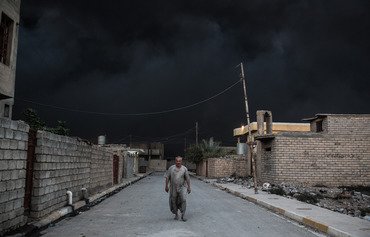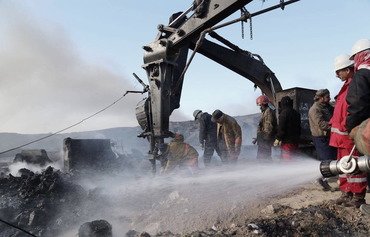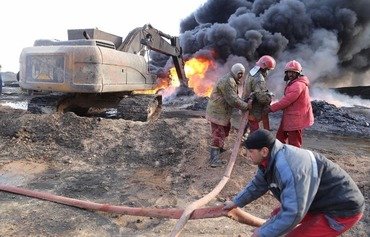Joint government teams are working to put out the remaining oil wells set on fire by "Islamic State of Iraq and the Levant" (ISIL) militants last August in al-Qayyarah, south of Mosul.
Before fleeing, ISIL fighters torched several oil wells, initially as a defensive measure to thwart coalition airstrikes. But as Iraqi forces started gaining ground, the group adopted a scorched-earth strategy, destroying as many oil wells as possible.
In the past six months, firefighting teams have extinguished 11 wells in the al-Qayyarah and Nejme oil fields, with four oil wells still ablaze, said Mahmoud Abdul Rahman Tabour, al-Qayyarah district council chairman.
Civil defense personnel and North Oil Company crews continue the work they started six months ago with great difficulty "as if they were in a battle of existence with the rising flames", he told Diyaruna.
Overcoming challenges
One of the first wells to be extinguished was the one close to al-Rummanah village, as firefighting crews feared the flames would reach the residents' homes.
"The fire was put out and the well buried after strenuous efforts that lasted nearly three months," Tabour said.
Firefighting efforts were delayed and became more complicated the further away the wells were from the Tigris River and other water sources, such as the liquefaction stations, he said. This required more water tanks and specialized equipment to transfer and pump water.
Water is an important element in the suppression of fires, Tabour said.
He explained that special pumping equipment is used to direct the flow of water at the tip of the well and around it to cool it down, which allows the repair teams to shut off or repair the valves from which oil flows.
Several valves required complex cooling and digging operations around the well tip before repair teams were able to shut them off, he added.
One of the remaining fires may require huge efforts and capabilities to put it out, he said, as the tip of the well is at a depth of three metres below ground level.
As for the other three fires, they can be easily controlled as the pressure of oil flow from those wells is small and has not caused huge fires, he said, adding that he expected all fires to be extinguished within the next few weeks.
Economic, environmental impact
It is still early to determine the economic impact of these fires on the energy sector, according to Iraqi MP Ali Faisal al-Fayyad, member of the parliamentary energy committee.
"The fires are still raging and when they are all fully extinguished, we will begin a scientific examination of the damage," he said.
"Specialised technical committees will assess the losses incurred, which are sure to be heavy losses," he added.
There are about 60 wells within al-Qayyarah oil field and adjacent Nejmeh field, including wells that are several metres deep.
"Rehabilitating the burned wells and reviving [oil] production again in the two fields will require a great amount of work," he told Diyaruna.
Before ISIL's invasion of Mosul in June 2014, the Iraqi government had been working for nearly two years to develop the al-Qayyarah and Nejmeh oil fields.
The plan was to raise their oil production from 30,000 barrels per day to 230,000 barrels per day by the end of 2016.
In addition to the impact the fires are expected to have on the economy, their flames have also been a major health hazard , said Khodar Elias, member of the Ninawa provincial council health and environment committee.
Dense plumes of black smoke have covered the sky above al-Qayyarah and surrounding areas for months, causing cases of severe suffocation among residents, he told Diyaruna.
With most fires now extinguished and limited to certain areas, the intensity of the fumes has diminished, but Elias warned they will have a lingering effect on the environment and health of residents.
The fires have caused the spread of several health conditions, including shortness of breath and pulmonary infections, especially among children in al-Qayyarah, he said.
They also polluted all sources of life in the area such as agricultural lands and water, he added.
"What the terrorists have done was a huge crime against both humanity and the environment," Elias said, calling on the government to double its efforts to mitigate the effects of the fires.

![North Oil Company crews are working to control the fires torched by 'Islamic State of Iraq and the Levant' in al-Qayyarah oil fields to slow the advance of Iraqi forces. [Photo courtesy of the Northern Oil Company]](/cnmi_di/images/2017/02/21/7298-qayarah-oil-burning-600_384.jpg)






